5th EU- Arab World Summit – Maritime Borders in the Mediterranean: the Cradle of Civilization Deserves a Civilized Solution
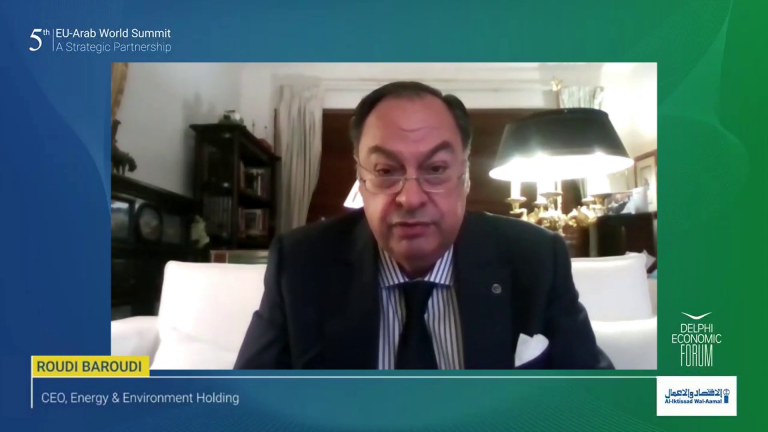

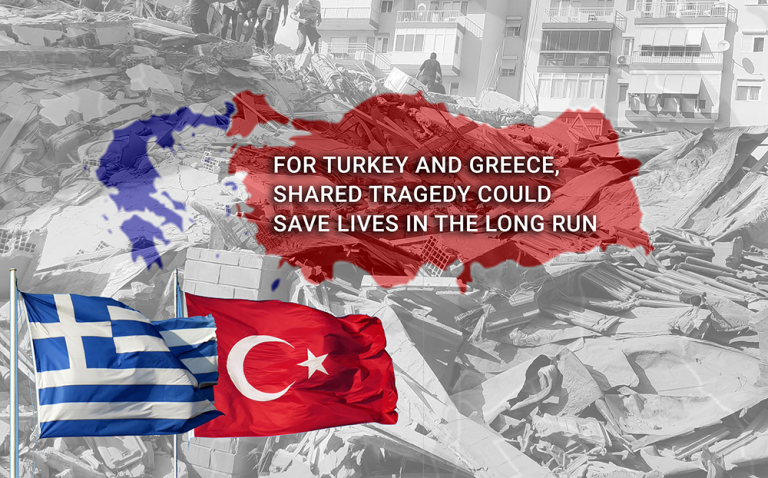
By Roudi Baroudi
The deadly earthquake that struck Greece and Turkey on Friday has brought out the best in the two countries’ leaders, who have exchanged not only condolences, but also offers of assistance.
Like other natural disasters, this one showed no regard for national borders. Most of the casualties and damage took place in the Turkish city of Izmir, but the epicenter was located beneath the seabed in Greek waters, and the two Greek youths who perished did so on the island of Samos, which lies less than 2 kilometers off the Turkish coast. Far from discriminating between the two neighbors, then, the quake was a (literally) jarring reminder that their fates are inextricably intertwined.
And yet, the mutual goodwill expressed by Turkish President Recep Tayyip Erdogan and Greek Prime Minister Kyriakos Mitsokakis owed most of its newsworthiness to the acrimony which has otherwise defined their relationship of late: most of their recent exchanges have involved accusations and even thinly veiled threats over rival territorial claims at sea.
The dispute is not new, but in recent years its urgency has grown exponentially due to discoveries of enormous oil and (mostly) gas deposits in the Eastern Mediterranean. Far from eliciting offers to exchange resources and expertise – in a deepwater setting that will require massive upfront investment and world-class technical capabilities – the two sides have approached the matter as zero-sum game. Each is behaving as though any gains it achieves can only come by inflicting equal-size losses on the other, but given the realities of the dispute, nothing could be further from the truth.
Already, the mere fact of their having not progressed to negotiate a maritime border treaty – one allowing both parties to get on with the businesses of exploration and development in their respective zones, and perhaps in some joint areas as well – is costing a lot of money, and not just in terms of time lost to unnecessary delay. The absence of an agreement also means that whenever the Turks send their seismic research vessel, the Oruc Reis, to study the seabed in disputed waters, they also have to bear the cost of an armed escort. They may take solace in the fact that the Greek are also paying heavily to monitor their activities, but there are no winners in such a contest. Both countries are only ensuring that whoever eventually finds, extracts, and sells the resources in question, the venture will have been less profitable than it should have been.
Similar obstacles apply to just about any scenario in which Athens and Ankara fail to delineate a mutually acceptable border and try to act unilaterally. Investors loath uncertainty, so any offshore blocks they auction off will fetch less money than they would if the dispute were settled. Underwriters are equally suspicious of oil and gas operations in potential war zones, which means that even if insurance can be obtained for ships, drilling rigs, and any other equipment, the price is likely to be exorbitant – and this is not to mention the cost of liability coverage relating to life and limb, environmental consequences, etc.
Why would anyone opt for such a murky, risky, and uncertain venture when a much clearer, safer, and surer one is so close at hand? From any conventional business perspective, the far superior route is to negotiate a mutually beneficial solution that gives both parties the ability to make plans and implement them without fear of delay or interference.
A generation or two ago, there might have been an excuse for one or both countries to question the advisability of an early settlement, but not anymore: not when the United Nations Convention on the Law of the Sea (UNCLOS) sets out clear standards for the fair and equitable resolution of maritime boundary disputes; not when satellite imagery and data processing technologies allow virtually all nation-states to obtain high-precision maps ahead of time; not when we have such an extensive background of previous cases and established precedent to indicate in advance what an eventual settlement will look like.
If they have not already done so, both countries can commission a company like Fugro to carry out a Law of the Sea study and, within a few weeks, know within a few centimeters where their maritime boundaries should lie. If there are compelling reasons to alter the legal or data inputs that produce these results, they can negotiate swaps and/or designate certain areas for joint management or even shared sovereignty. Whatever the solution, it will be better than the bellicose rhetoric and high-seas brinkmanship on which they have recently relied.
Right now the priority has to be on search and rescue, saving any lives that can still be saved, taking care of those made homeless by the quake, and determining the full extent of the damage caused by the quake. Nothing should delay this process.
Once the danger has passed and the vulnerable have been secured, however, Greece and Turkey should follow their own example in this post-quake period by moving to defuse tensions and start talking about how to resolve their differences quickly, practically, and peacefully. Why waste any more time, expend any more resources, or risk any more lives when a negotiated solution is so easily obtainable?
Roudi Baroudi, a four-decade veteran of the energy business and CEO of Doha-based Energy and Environment Holding, is the author of “Maritime Disputes in the Eastern Mediterranean: The Way Forward”, published by the Transatlantic Leadership Network and distributed by the Brookings Institution Press.

Roudi Baroudi is CEO of Energy and Environment Holding, an independent consultancy based in Doha.
He also is the author of “Maritime Disputes in the Eastern Mediterranean: the Way Forward”, published earlier this year by the Transatlantic Leadership Network and distributed by the Brookings Institution Press.

تحت عنوان “شرق المتوسط مياه هادئة، مشتعلة، جامدة”، تحدّث الخبير في شؤون الطاقة رودي بارودي على قناة “الجزيرة” عبر تقنية الفيديو، عن العوامل التي تدعو الأفرقاء في شرق المتوسط إلى التعاون وتسوية النزاعات، فأكد توفّر الحلول السلمية للنزاعات حول الحدود البحرية، وأشار إلى أن “الولايات المتحدة قبل 75 سنة وبقية النظام الدولي الذي تم تأسيسه بعد الحرب العالمية الثانية ونظام الأمم المتحدة، كله تم تصميمه من أجل جعل النزاعات المسلحة شيئاً من الماضي وتنظيم العلاقات ما بين الدول… إذاً الدول قد تدخل في فرضيّة عدم اتفاق لكن من دون السقوط في علميات العنف بين الدول. لذلك هناك اتفاقات ومعاهدات من أجل السلم والأمن الجماعي”، مؤكداً أن “الأطراف كافة تتقيّد بكل الالتزامات القائمة من أجل حل نزاعاتها بشكل سلمي”.
وقال في السياق: اليونان وتركيا دولتان جارتان ولديهما الكثير من النقاط المشتركة، كما تعانيان من النزاعات القائمة، أما الأراضي التي جرى الحديث عنها، قد تكون تغيّرت بسبب اتفاقات عدة كاتفاقية جنيف، وكذلك بعض المجموعات السكانية ربما تم منعها…
وأضاف: الأمور ليست مثالية، فالنظم القائمة في العالم فيها الكثير من نقاط الضعف لكن الوضع هو أفضل بكثير مما كان عليه تاريخياً عندما ننظر إلى الماضي حيث أن الغلبة للأقوى عندما يستغل القوي الضعيف، لذلك هذا النظام موجود لأننا نريد حل هذه المشاكل، لكنه الالتزام به ليس بالطريقة المطلوبة.
وأوضح أن “المشكلات والنزاعات المتعلقة بالحدود البحرية طالما كوّنت إشكالية خصوصاً أن ليس هناك حكومة تريد النظر إليها على أن تتخلى عن أي جزء من أراضيها والتي ينظر إليها الشعب على أنها جزء من أراضيهم. من هنا، بإمكان الخبراء والمختصين بالخرائط أن يلتقوا سوياً للنظر إلى مثل هذه الأمور ويتفقوا على المكان الذي يتم فيه رسم هذه الحدود”.
وأشار إلى أن الحدود البحرية هي أكثر تعقيداً وتبدأ من الحدود البرية، وقال: الأمم المتحدة طوّرت آلية لحل هذه النزاعات المتعلقة بمثل هذه القضايا وكل من تركيا واليونان والدول الأخرى كانت حاضرة، البعض وقّع والبعض الآخر لن يوقّع، وتتضمّن قواعدَ بكيفية ترسيم الحدود البحرية والجرف القاري والحدود الأخرى. وغالبية الأعضاء في الأمم المتحدة والدول المنضوية وقّعت وصادقت على هذه الاتفاقية حتى في حالات تم حلّها بأطر غير ثنائية أو معاهدات، فإن المبادئ ذاتها تنطبق على هذه الدول.
وذكّر بأن “النزاعات الجارية والتي تم النظر فيها إما مع محكمة العدل الدولية أو من خلال غرف التحكيم، كلها تركّز على المعايير والمبادئ المتعلقة باتفاقية قانون البحار، بما في ذلك على الدول التي ليست طرفاً في هذه الاتفاقية”.
وتابع بارودي: عندما يتعرّف الناس على هذه الاتفاقية، يقولون “إذا كان الأمر كذلك، لماذا لم يصادق العالم على هذه الاتفاقية؟ ولماذا لم يتم تعريف كل الحدود؟”، الجواب على هذا السؤال المهم، أن السبب الأساسي هو أن تكنولوجيا التقاط الصوَر والحَوسَبة عالجت كل المخالفات المتعلقة بها هذه الاتفاقية والدراسات التي بُنيت عليها، حتى أن هذه القدرات والإمكانات كانت مكلفة بالنسبة إلى الجميع، لكنها كانت متاحة للحكومات الثريّة.
وعن القوى لاتي تملك التأثير في دفع الأفرقاء المتنازعة إلى تسوية الخلافات ما بينها، قال: هناك 21 دولة في منطقة المتوسط الأوروبي وكلنا نستحق أن نعيش بسلام، فقد سئمنا الحروب… ويجب التفكير ما هو الأفضل بالنسبة إلى شعوبنا وأجيالنا وأطفالنا. على الأقل إن لم نتمكن من الاجتماع سوياً، فالولايات المتحدة مستعدة بالتأكيد للمساعدة وكذلك الاتحاد الأوروبي، والأمم المتحدة، وكذلك المملكة المتحدة بما أنها خرجت من الاتحاد الأوروبي فتستطيع بالتالي لعب دور الوسيط الحيادي، ولكن الأهم هو احترام القانون.
الأمر الأهم هو أن الأقوى لا يحترم القانون وعلى سبيل المثال إسرائيل. جلّ ما في الأمر أن علينا أن نتحاور بعيداً من السياسة. لنترك للسياسيين النزاع… ولندَع الشعوب تعيش، ولندَع اقتصاد عمق البحار الذي يمكنه إنقاذ الشعوب. فهم بأمسّ الحاجة إلى أنظمة الرعاية الصحية والتعليم والأمن والكهرباء والهاتف بأسعار مقبولة ولتتركنا الدول الأجنبية في حالنا. يجب أن نعمل من أجل السلام ولدينا الآليات الضرورية اللازمة، وعلى سبيل المثال إن تركيا واليونان لديهما كل العلماء والخبراء وأفضل الدكاترة أصحاب الخبرة كي يجلسوا ويتصافحوا ويتوصلوا إلى اتفاق، خصوصاً أن أبناء الدولتين عاشوا داخل أراضي بعضهما البعض لسنوات، لماذا لا يقدرون الآن على تكرار التجربة.
وعن ترسيم الحدود بين لبنان وإسرائيل، قال بارودي: لسوء الحظ، مرّت الدولة اللبنانية بمطبّات وحروب …إلخ، وصدر عن مجلس الأمن ما يُسمّى الخط الأزرق وهو لا يصل إلى المنطقة البحرية… هناك منطقة نزاع تمتد على 872 كلم2 بحسب العلماء والخبراء، ووفق قرارات الأمم المتحدة يحصل لبنان على ما لا يقل عن الثلثين، لأن إسرائيل استخدمت بعض الصخور وقامت باحتساب بعض حدوده البحرية. والولايات المتحدة مستعدة لمساعدتنا في هذا الموضوع، وتريد اعتماد الوساطة الجيّدة، الأمر الذي يساهم في حَل المشكلة.
ولفت إلى أن الـ”بلوك 9″ غني بالموارد “ويساعدنا على العيش بسلام ومن شأنه أن يقضي على الفقر”.
وعن شكل التسوية التي تراعي موازين القوى ومصالح مختلف الأطراف في شرق المتوسط، قال: حين تُحل المشكلة بين تركيا واليونان ينسحب بالطريقة نفسها على قبرص بجزءَيها، وتتوحّد الجزيرة.
وختم: إذا كان شرق المتوسط يعيش بسلام بدون أي نزاعات أو عنف، فقبرص قريبة جداً من الساحل التركي… المطلوب النضج واحترام القانون والتناغم من أجل إبعاد الحرب، هذا كل ما نحتاج إليه.
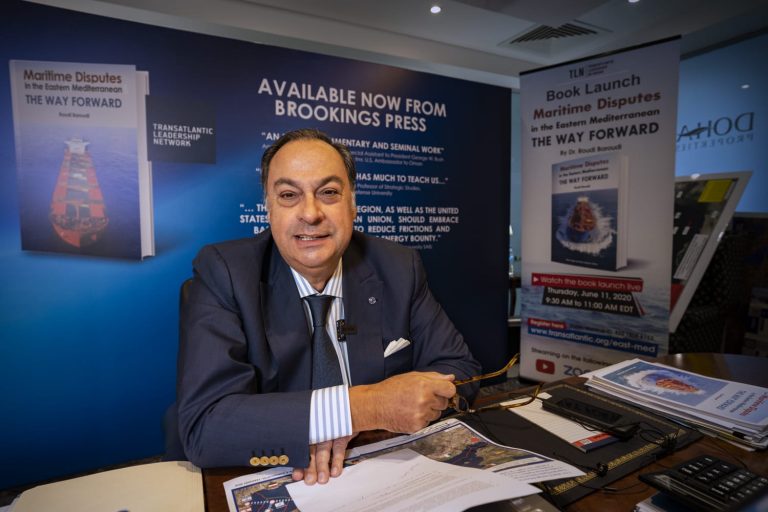
The Eastern Mediterranean is once again at the center of what can go wrong when countries fail to resolve decades-old disputes over offshore Exclusive Economic Zones (EEZs). On the face of it, the latest Greece-Turkey skirmish makes little sense now other than playing to domestic audiences and putting down markers to ensure a future piece of whatever this natural gas-rich part of the world has to offer. In today’s brutal economic climate, few energy companies are lining up to undertake new projects, which means it will take longer for actual production to begin under the best circumstances. What’s more, Turkey may not have the financial wherewithal or capacity to do the exploration and development work on its own, and no private energy company is likely to invest serious capital in a project that can be tied up for years by competing EEZ claims. This maximalist approach to solving maritime disputes will not work. Equitable results, perhaps based on the equidistance principle — a methodology endorsed by the 1994 UN Convention for Law of the Sea (UNCLOS) — would be the best way forward for settling the Greece-Turkey maritime boundary dispute.
The development of Israel’s huge Leviathan natural gas field is a model studied closely by others in this region. Texas-based Noble Energy, which is now merging with Chevron, discovered Leviathan 10 years ago and quickly recognized that it was not only a world-class field, but that it needed an EEZ treaty for development to proceed without being contested by Cyprus. Noble carried out its own internal Law of the Sea desktop study, which became the basis for Israel’s EEZ treaty with Cyprus. It also issued an ultimatum to the Israelis that no further exploration would take place until the EEZ deal was finalized. This pressure from Noble not only prompted the Israeli government to conclude a treaty with Cyprus, it did so in a document that explicitly states Israel must adhere to UNCLOS rules despite not being a signatory of the treaty. That in itself is an enormous change with broad economic implications.
While four of the seven recognized coastal states (Greece, Turkey, Syria, Cyprus, Lebanon, Israel and Egypt), are not signatories to the treaty, there is now a general understanding that even non-signatories to UNCLOS are increasingly ready to abide by its principles in settling disputes. The real threat to the East Mediterranean’s prospects as an energy hub is politics, specifically the zero-sum games that have constricted and warped regional interactions. The best way to proceed is an orderly process in which Mediterranean maritime boundaries are fully delineated and individual countries are free to develop the resources within their respective EEZs. The UNCLOS contains a comprehensive rulebook for the fair and equitable resolution of such disputes by subjecting them to consistent legal standards and detailed scientific observations.
Necessary Conditions
Given the UNCLOS, the obvious question is: Why are we still talking about unresolved maritime boundaries in the Eastern Mediterranean? The short answer is that until recently few of the necessary conditions were in place. Since its inception, both technology and case law have evolved. Old colonial-era charts were highly unreliable, with depictions of even easily observable shoreline features off by a kilometer or more. New, accurate technological mapping has removed much of the guesswork. The outcome of any legal process based on UNCLOS can now be predicted with considerable reliability.
The Israel-Cyprus treaty has itself been challenged by Lebanon, which has alleged that its neighbors used faulty coordinates for its shoreline border with Israel, thereby mistakenly locating the offshore “tripoint” among the three countries’ respective EEZs several kilometers from where it should be. But Israel has agreed to be bound by UNCLOS standards, making resolution possible. The situation also makes clear that precision mapping technology — now at the disposal of any government willing to pay for a Law of the Sea study — has finally established a clear, objective basis for discussion.
In what could be a valuable point for both Turkey and Greece, this crucial degree of accuracy, often down to sub-meter measurements, should make it easier for governments to sell any agreements they reach to their respective publics. It also leaves too little room for naysayers at home or abroad to accuse anyone of backing down or selling out. German efforts to reconcile the interests of Turkey and Greece are commendable, and with precision mapping accuracy both governments can reduce economic and political pressure while simultaneously demonstrating the potential advantages of reconciliation.
Clear Benefits
The Eastern Mediterranean’s emergence as an oil and gas hub promises a cure for the region’s poverty and instability. The first discoveries were located in uncontested waters off Egypt and Israel, so development was fairly straightforward. In addition, most of the deposits were in the form of natural gas, whose cleaner properties and growing ubiquity as a global commodity, may give it better medium- and long-term market prospects than oil.
These discoveries and others that could follow are critical for the growing economies in the region, which need greater energy diversity and independence. Commercial interest in these resources also remains strong. Noble’s East Mediterranean gas interests are considered one of the prize assets that Chevron was after in its bid. The energy majors already invested in offshore Cyprus, including the Exxon Mobil/Qatar Petroleum (QP) and Total/Eni consortia, have postponed — not canceled — exploratory drilling in their respective blocks. The involvement of QP is also a signal of long-term stability. As one of the world’s most deep-pocketed national oil companies, its gas strategy is measured in decades, as Energy Minister Saad al-Kaabi likes to say.
Even with the current extraordinary economic circumstances of the coronavirus pandemic, for which few companies and governments were prepared, the East Med should remain attractive and financially appealing going forward. The resources are still there and, while their current market value has been diminished, the potential deposits are still highly prized assets whose development, extraction and sale can be expected to generate many hundreds of billions of dollars over several decades. Despite the increasing competitiveness of renewables, the ubiquity and low carbon profile of gas will keep it in the global energy mix for years to come.
Roudi Baroudi is CEO of Energy and Environment Holding, an independent consultancy in Doha. His recent book, “Maritime Disputes in the Eastern Mediterranean: The Way Forward,” is published by the Transatlantic Leadership Network and distributed by the Brookings Institution Press.
Debra Cagan is the Distinguished Energy Fellow at the Transatlantic Leadership Network. She is a former career US State Department and Defense Department official, having served from the Reagan to the Trump administrations.
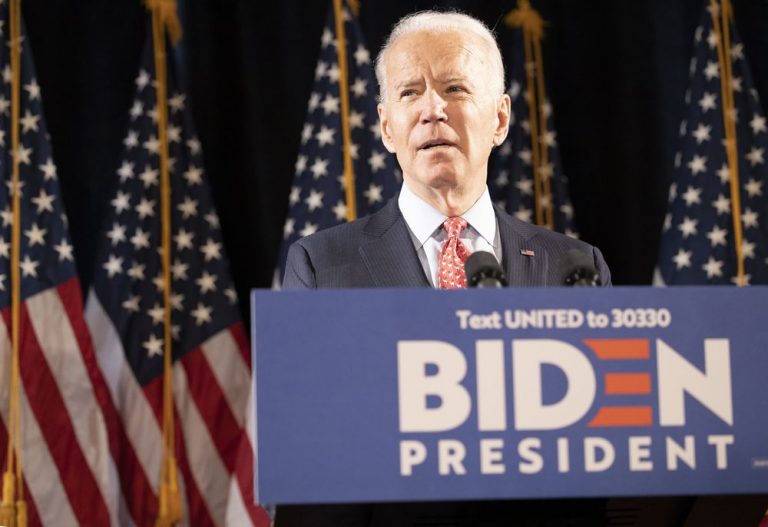
Climate-change activists are pressuring Joe Biden to distance himself from former Obama administration advisers they view as either too moderate or too cozy with the fossil-fuel industry, a sign of disunity on the eve of the Democratic convention.
Groups such as Data for Progress and the Revolving Door Project are building a case against some people advising the Democratic presidential nominee, such as former Energy Secretary Ernest Moniz and President Barack Obama’s environment aide Heather Zichal. Both have served on the boards of companies linked to fossil fuels since leaving government.
The effort reflects simmering tension between the party’s moderate nominee and progressives whose votes he needs to win. Polls show a lack of enthusiasm for Biden among young voters, something that could be exacerbated by open divisions within the environmental movement. But if climate activists succeed in pulling him to the left, it could cost him mainstream support.
The activists are collecting information on the advisers and formulating a strategy that could include a letter-writing campaign and petitions, similar to what has been employed to pressure Biden to sever ties with Obama’s one-time National Economic Council Director Larry Summers. Summers is a contributor to Bloomberg Television.
Obama’s record on cutting greenhouse-gas emissions was widely regarded as ambitious at the time. But activists say now there’s no time left for anything other than a no-holds barred approach.
Not everyone’s on board with the activists’ approach, with the election quickly approaching. Biden is close to naming a running mate as the party prepares for a trimmed down, four-day nominating convention in Milwaukee set to begin Aug. 17.
Some environmentalists prefer to focus on helping Biden defeat President Donald Trump and stop his rollback of environmental regulations. Trump, who is withdrawing the U.S. from the Paris climate treaty, has repeatedly called climate change a “hoax.” By contrast, Biden’s $2 trillion plan for combating climate change won robust praise last month from across the spectrum of environmental advocacy groups.
Others worry that a climate purity test means muzzling some of the nation’s top energy experts.
“It’s OK right now that he’s relying on those people, because he’s got to focus on the primary objective — which is stopping the catastrophe we are in right now,” said Brett Hartl, chief political strategist for the Center for Biological Diversity Action Fund.
But critics say Biden’s reliance on a stable of former Obama energy officials is already limiting the Democratic presidential candidate’s climate ambition.
Read More: Biden Feels Heat From Left to Drop Larry Summers as an Adviser
“The people who built the system and are profiting from it are not going to want to tear it down,” said Collin Rees, a senior campaigner with Oil Change U.S., an environmental group that advocates shifting away from fossil fuels.
None of the targeted officials are employed by the Biden campaign, though Zichal, Bordoff and Moniz have informally advised it, according to people familiar with the matter who asked not to be identified. And the campaign is widely consulting outsiders; senior campaign officials said they conferred with scientists and leaders of the environmental justice movement in developing Biden’s $2 trillion climate plan.
The activists point to signs of caution, including language in a Biden-Sanders unity task force report that rules out public financing of overseas coal projects but leaves the door open for supporting natural gas ventures.
Some environmental activists are advancing an array of choices deemed acceptable as possible cabinet members — from Washington Governor Jay Inslee for Interior secretary to California Air Resources Board Chair Mary Nichols as Environmental Protection Agency administrator.
Biden is naturally relying on advice from some of Obama’s old hands, having worked with many of the same advisers during his eight years as vice president, Hartl said.
Activists say they are most concerned by what Biden’s team has done in recent years — not the policies they pushed as part of the Obama administration.
“We are gearing up,” said RL Miller, chair of California Democratic Party’s environmental caucus and a member-elect to the Democratic National Committee. “We will be exposing the flaws in these people’s records as climate peacocks and we will be making it toxic for Joe Biden to be taking advice on matters of energy from them.”
Zichal has served on the board of Cheniere Energy Inc., which became the first major U.S. exporter of shale gas in 2016, and has stressed the need to find a “middle ground” environmental policy. She also continues to promote marine protections and sustainability as head of the Blue Prosperity Coalition, has discouraged new offshore drilling off South Africa and previously was vice president of corporate engagement for the Nature Conservancy. Zichal declined to comment.
Like Summers, Bordoff has praised energy exports, noting earlier this year that increased foreign sales of liquefied natural gas help lower the price of the fossil fuel that can displace dirtier-burning coal in generating electricity. He has also warned about “dwindling time” to make progress fighting climate change and last month argued the issue should be “squarely at the center of U.S. foreign policy.”
Bordoff is helping guide Columbia University’s creation of a climate school and develop a public database with environmental groups to track whether countries are spending Covid-19 recovery dollars to underwrite fossil fuels or clean energy.
“Throughout his career in policy and academia, Jason has focused on the urgency of the climate crisis and worked to achieve more rapid and ambitious action to achieve net-zero emissions by 2050,” said Artealia Gilliard, the Center on Global Energy Policy spokeswoman.
Moniz, an informal adviser to the Biden campaign, has joined the board of Southern Co., a utility that generates power from natural gas, coal, nuclear and renewables. He also proposed a “Green Real Deal” alternative to the “Green New Deal” backed by progressives. He’s drawn fire for forming a partnership with the AFL-CIO that endorses an “all-of-the-above” climate change strategy.
David Ellis, a spokesman for the Energy Future Initiative, a think tank led by Moniz, declined to comment. But he pointed to testimony Moniz gave earlier this year saying he “endorses a focus on the simultaneous needs for achieving deep decarbonization and ensuring that social equity issues are central in the clean energy transition.”
Hochstein, a former special envoy and coordinator for international affairs under Obama, worked with the State Department to ensure American energy companies had access to global oil fields. More recently, he has warned of the need to stabilize oil-dependent nations as the world moves away from petroleum and has stressed the importance of natural gas in buttressing renewable power.
“I am not advising the Biden campaign, and I fully and 100% support the climate agenda that the campaign has laid out,” Hochstein said.
Biden should be getting advice from people who recognize there needs to be an end to fossil fuels instead of embracing “false solutions” that allow the construction of more oil pipelines and gas development for decades to come, said Rees, the Oil Change U.S. official.
“Ten years ago, we were certainly in a different place,” Rees said. “Today, there’s no lack of powerful voices, there’s no lack of people who know their stuff, there’s no excuse for essentially defaulting to energy consultants when you are talking about these kinds of things.”

تصاعدت التوترات بين اليونان وتركيا في الفترة الأخيرة بعدما أرسلت أنقرة سفينة للتنقيب عن النفط بالقرب من منطقة تطالب بها أثينا.
خبير الطاقة الدولي رودي بارودي أجرى في حديث لـ”سبوتنيك”، تقييماً للوضع المتفجّر بين الطرفين، فقال: إذا لم تلتزم الأطراف بالمبادئ ذاتها الناتجة عن اتفاقية الأمم المتحدة لقانون البحار، ولم تسارع إلى إيجاد أرضية مشتركة، فإن مخاطر النزاع المسلح جدية. فتركيا واليونان يمكنهما الاستئناف أمام المحاكم الدولية، ويمكنهما كذلك اللجوء إلى التحكيم إذا فشل الطرفان في الاتفاق على شكل من أشكال الإجراءات الدبلوماسية التقليدية لحل مطالبهما الإقليمية المتداخلة.
ووفق بارودي “يمكن ان يكون هناك حل عادل لكلا الطرفين، حل ينطلق من “منطق محايد” لقانون البحار، والذي تم استخدامه في مناسبات عدة في أجزاء أخرى من العالم لحل النزاعات سلمياً. ويمكن لشركات مثل Fugro التي تقدمّ حلولاً متقدّمة لرسم الخرائط و/ أو تستخدم خرائط عالية الدقة للشواطئ، أن تقدّم سريعاً “نتائج دقيقة ومتّسقة” لكل ولاية”. وتابع: هذا هو الطريق: الاعتماد على القانون والعلم والقواعد المعمول بها… وليس على التهديدات والشرائع.
وتعليقاً على الاتفاقات التي وقّعتها من أجل إعادة تحديد حدودها البحرية، تركيا مع ليبيا في عام 2019 من جهة، واليونان مع مصر في 6 آب من جهة أخرى، وما إذا كانت هذه المعاهدات معترف بها من قبل الدول المجاورة والمجتمع الدولي، قال بارودي “في الوضع الراهن، حدّدت هذه الدول الساحلية الحدود البحرية التي يبدو أنها تضمّ مناطق متداخلة ولا يزال لدى الدولتين الحق في رسم مثل هذه الحدود بموجب القانون الدولي، لكن هذه المعاهدات تلزم فقط تلك الدول التي تصادق عليها وليس دولًا ثالثة”.
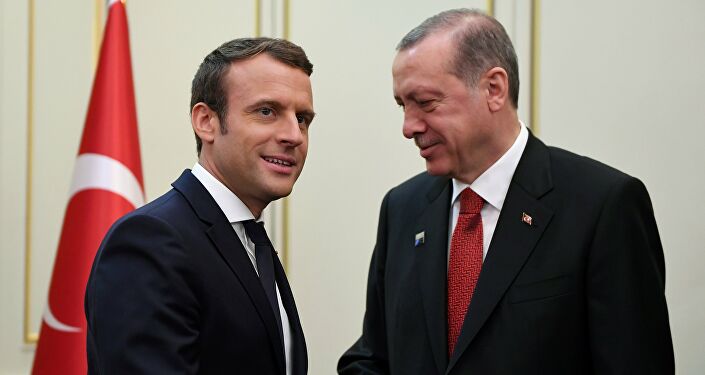
La tension est à son comble entre la Grèce et la Turquie depuis l’envoi par Ankara d’un navire de recherche près d’une zone revendiquée par Athènes. Selon Roudi Baroudi, expert en énergie et des conflits en Méditerranée, si les parties ne trouvent pas rapidement un terrain d’entente, les risques d’un conflit armé sont réels. Entretien.
Rien ne va plus entre Athènes et Ankara depuis qu’un navire turc consacré à la recherche sismique a été envoyé tout près de l’île grecque de Kastellorizo. Aussi connue sous le nom de Megísti, l’île est située à deux kilomètres des côtes turques et à environ 580 kilomètres d’Athènes. Après avoir brièvement suspendu ses recherches d’hydrocarbures, Ankara a annoncé que son opération allait reprendre. Pour soutenir la Grèce, la France a décidé de renforcer sa présence dans les eaux disputées.
Pour faire le point sur cette situation explosive, Sputnik s’est entretenu avec Roudi Baroudi, spécialiste de l’énergie internationalement reconnu. M.Baroudi a notamment travaillé en collaboration avec la Banque mondiale, le FMI, la Commission européenne, l’Agence des États-Unis pour le développement international et le Fonds arabe pour le développement économique et social. Il vient de publier le livre Maritime Disputes in the Eastern Mediterranean (Éd. Brookings), consacré aux conflits en Méditerranée.
Sputnik: Est-ce le début d’un conflit majeur?
Roudi Baroudi: «La première chose à considérer est que si les parties n’adhèrent pas aux mêmes principes découlant de la Convention des Nations unies sur le droit de la mer, le différend ne peut pas prendre fin. Si tel est le cas, les 20 prochaines années ne peuvent que ressembler aux 20 dernières années: les tensions vont persister ou, pire, conduire à un réel conflit armé.
La réalité est que ces derniers jours, le navire d’exploration turc a effectué des tirs sismiques dans une zone qui ferait presque certainement partie de la Zone économique exclusive reconnue de la Turquie si les parties appliquaient les principes de la Convention des Nations unies sur le droit de la mer et respectaient celui d’équidistance. C’est un constat auquel les parties pourraient en venir si elles voulaient en arriver à une solution équitable tenant compte de toutes les caractéristiques de la zone immédiate. Autrement dit, si les deux pays s’engageaient à négocier une solution équitable ‘‘à la lettre’’, en mettant en œuvre les règles établies dans le cadre de la Convention des Nations unies sur le droit de la mer.»
Sputnik: Selon l’expert Christian Fleury, interrogé récemment par Sputnik, la Méditerranée regorge de conflits potentiels de ce type. La Méditerranée peut-elle vraiment devenir une poudrière à cause de la recherche d’hydrocarbures?
Roudi Baroudi: «Eh bien, cela est vrai en Méditerranée orientale où le conflit israélo-arabe, par exemple, dure depuis plus de 75 ans et en raison d’autres facteurs. Néanmoins, si les dirigeants de la région devaient s’asseoir et s’engager véritablement à résoudre leurs différends pacifiquement –comme ils sont tenus de le faire en vertu de la charte des Nations unies et tenus d’utiliser les structures de partenariat de l’UE disponibles–, je ne doute pas qu’ils pourraient finir par conclure des accords qui isolent la recherche de profits liée aux hydrocarbures des effets de leurs désaccords politiques.
À certains égards, cela s’applique en particulier à la Grèce et à la Turquie. Ces deux pays sont actuellement dirigés par des individus dont les référents nationalistes les encourageraient sans doute à parvenir à un accord. Il est important de noter que si la Grèce et la Turquie ont déclaré unilatéralement leurs frontières maritimes hypothétiques, aucune de leurs revendications n’a été enregistrée, publiée ou même déposée auprès de la Division des affaires maritimes et du droit de la mer des Nations unies, ce qui signifie qu’elles ne sont pas reconnues internationalement.
Il existerait une solution équitable pour les deux parties, celle qui procède d’une ‘‘logique neutre’’ du droit de la mer et qui a été utilisée à plusieurs reprises dans d’autres parties du monde pour résoudre pacifiquement des conflits similaires. Cette solution tiendrait compte des petites îles grecques isolées tout en offrant le meilleur compromis aux deux États côtiers pour l’ensemble de la mer Méditerranée.»
Sputnik: Selon vous, la Turquie et la Grèce devraient donc faire appel aux tribunaux internationaux?
Roudi Baroudi: «C’est définitivement une option, tout comme l’arbitrage, si les parties ne parviennent pas à se mettre d’accord sur une forme de procédure diplomatique conventionnelle pour résoudre leurs revendications territoriales qui se chevauchent. Quelle que soit la manière de dialoguer, tant qu’ils acceptent de suivre les principes de la Convention des Nations unies sur le droit de la mer, les progrès récents de la technologie rendent le résultat des négociations beaucoup plus prévisible qu’il ne l’aurait été auparavant.
Des entreprises comme Fugro offrant des solutions de cartographie avancées et/ou utilisant une cartographie de haute précision du littoral peuvent fournir rapidement et précisément des ‘‘résultats reproductibles cohérents’’ pour chaque État (ou d’autres entités) comme jamais auparavant. Ces nouvelles technologies tournent la page de décennies de méfiance, laquelle a toujours représenté un grave problème quand il fallait définir des frontières maritimes offshore.
Ces nouvelles technologies permettent une cartographie précise des points de terminus terrestre (les régions frontalières de l’interface terre-mer), et en mer, des points de trijonction, c’est-à-dire là où, précisément, les Zones économiques exclusives de trois États côtiers se rencontrent pour former un point commun. Ces nouvelles technologies éliminent d’autres éléments sur lesquels il pourrait y avoir des différends et facilite l’interprétation de laConvention des Nations unies sur le droit de la mer afin que les deux parties obtiennent une ‘‘victoire’’ de manière équitable.
La Grèce et la Turquie ont la possibilité de suivre, entre autres, l’exemple des règlements des litiges ayant opposé le Bangladesh et le Myanmar, le Nicaragua et le Honduras, la Libye et la Tunisie, etc. C’est la voie à suivre: s’appuyer sur la loi, la science et les règles en vigueur et non sur les menaces et les canons.»
Sputnik: Afin de redéfinir leurs frontières maritimes, la Turquie a signé un accord avec la Libye en 2019 tandis que la Grèce en a signé un avec l’Égypte le 6 août dernier. Ces traités sont-ils reconnus par les États voisins et la communauté internationale?
Roudi Baroudi: «Dans la présente situation, ces deux paires d’États côtiers ont défini des frontières maritimes extracôtières qui semblent avoir des zones de revendication qui se chevauchent. Pour chaque paire d’États côtiers (la Turquie et la Libye ainsi que la Grèce et l’Égypte), ces accords peuvent être considérés comme des tentatives de définir de nouvelles frontières bilatéralement. Cependant, étant donné que les accords provisoires potentiels ne prenaient pas en considération les effets possibles sur les droits des États voisins, ils sont uniquement considérés comme des accords bilatéraux. Deux pays ont toujours le droit de tracer ce genre de frontières en vertu du droit international, mais ces traités n’engagent que les pays qui les ratifient et jamais les pays tiers.»
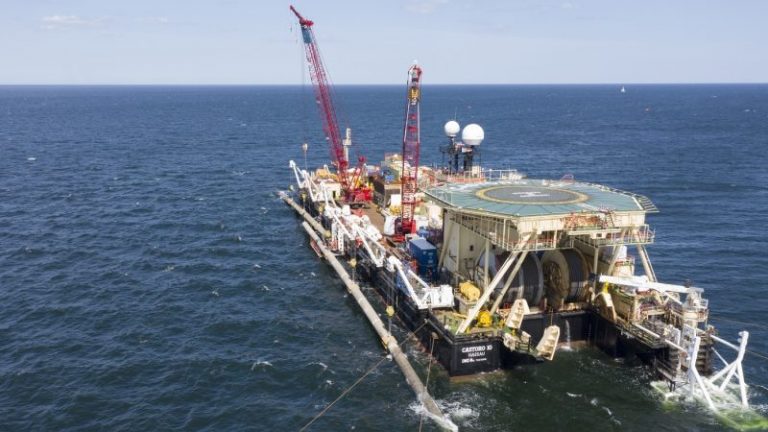
Twenty-four European Union countries complained to the U.S. State Department this week over President Donald Trump’s expansive use of sanctions to help influence American foreign policy goals, according to a European diplomat familiar with the communication.
The message, supported by all but three of the bloc’s member states, was given on Wednesday, said the diplomat, who asked not to be identified because the correspondence hasn’t been made public.
Read More: U.S. Threat of ‘Crushing’ Gas Pipeline Measures Riles Berlin
The so-called demarche was based on a July 17 statement by the EU’s top foreign policy official, Josep Borrell, in which he condemned U.S. intimidation tactics. He specifically cited Trump’s sanctions aimed at halting construction of the Nord Stream 2 gas pipeline, which would link Russia and Germany.
“Our actions are aimed at curbing Russia’s malign activity,” according to an emailed statement from a State Department spokesperson. “We continue to work with our European partners to make it clear that Nord Stream 2 enables Russia to use its energy supplies as a political weapon in Europe and undermine Ukrainian security.”
Relations between the U.S. and the EU — and Germany in particular — have plumbed new lows, with Trump hitting his transatlantic allies with sweeping tariffs and pulling out of multilateral agreements such as the Paris climate accord and the Iran nuclear deal. Trump also announced plans to withdraw about 12,000 troops from Germany last month, saying Chancellor Angela Merkel’s government had been “delinquent” on defense spending.
“There was an informal outreach which the EU member states could join on a voluntary basis,” EU Spokeswoman Nabila Massrali told reporters on Friday when asked about the complaint. She added that the U.S. threatening sanctions against European companies was “part of a wider, worrying trend.”
The Nord Stream 2 gas pipeline has become a central point of tension between Merkel and Trump, who has blasted the project for sending “billions” to Russia. Merkel has called new sanctions aimed at the gas route illegal. Still, there is no consensus among the EU on Nord Stream, with countries such as Poland condemning the pipeline for bypassing eastern Europe and increasing the bloc’s reliance on Russian energy.
Last week, three Republican Senators ratcheted up tensions with a letter warning that a German Baltic Sea port would face “crushing legal and economic” sanctions if it continued to participate in the completion of the pipeline. Mukran Port, located in Merkel’s constituency, is a supply base for the 1,200-kilometer (745-mile) undersea pipeline.
German Foreign Minister Heiko Maas this week said EU member states would discuss to what extent extraterritorial sanctions violate international law, as he renewed his condemnation of U.S. threats.
“No state has the right to dictate Europe’s energy policy with threats — and it won’t work,” Maas told reporters Monday alongside Russian Foreign Minister Sergei Lavrov during a daylong visit to Moscow.
All stakeholders of Nord Stream 2 still aim to complete the gas link, Lavrov said at the briefing. “There are reasons to assume that it will be done in the near future.”

من خلال خط يتوسّط الخطّين الأحاديين المعلنين من الطرفين، يتبيّن أنّ من حق لبنان بسط سيادته على رقعة أكبر من تلك التي حدّدها خط هوف، أو التي عرضت خلال المفاوضات مع الجانب الأميركي، ويمكنه بالقانون الاستحصال على ما لا يقل عن %55 من المنطقة المتنازع عليها.
في الأوّل من كانون الثاني 2007، وقّع لبنان وقبرص معاهدة ثنائية لترسيم الحدود المواجهة للدولتين، لكنها لم تقرّ في مجلس النواب اللبناني اعتراضاً على اتفاق ترسيم الحدود البحرية بين قبرص وإسرائيل الموقّع في كانون الأوّل 2010 ولا سيّما النقطة 23 جنوباً، وبالتالي لم تدخل حيّز التنفيذ. يبلغ طول خط الحدود البحرية بين لبنان وقبرص نحو 158.8 كلم ويتألف من 6 نقاط تحوّل أساسية، وحُدِّدت من خلال اعتماد الخط ذاته الإحداثيات المتساوية في المساحة البحرية المواجهة لكل من لبنان وقبرص، واستخدمت مخطّطات بحرية دقيقة وقاعدة بيانات متطوّرة للمعلومات الجغرافية.
في دراسة وضعها الرئيس التنفيذي لشركة الطاقة والبيئة القابضة والخبير في صناعة الطاقة رودي بارودي ونشرها معهد عصام فارس في الجامعة الأميركية، يغوص بارودي في تاريخ ملف ترسيم الحدود البحرية اللبنانية، فلبنان أعلن ترسيماً أحاديّاً لحدوده البحرية الشمالية مع سوريا خلال عملية تقسيم المياه الإقليمية إلى بلوكات، وتمّ ايداع نسخة من الترسيم في مكتب شؤون المحيطات وقانون البحار في الأمم المتّحدة على رغم عدم توقيع سوريا اتفاق الأمم المتحدة لقانون البحار واتفاق جنيف 1958، ويعتقد بارودي الذي تحدث لـ”النهار” أنّه تمّ استخدام قواعد الخط ذات الاحداثيات المتساوية (Strict Equidistance geodetic line) خلال ترسيم الحدود، واعتماد خطوط الأساس العادية (Basic Normal Baselines) للبنان وعلى الأرجح خطوط السواحل (Basic Coastlines) لسوريا.
تظهر الخرائط المرفقة تداخل البلوكات البحرية لكلا البلدين، إذ تخرق البلوكات اللبنانية المياه الإقليمية السورية بنحو 1.7 كلم، فيما تخرق البلوكات السورية المياه الإقليمية اللبنانية بنحو 15.3 كلم، وينتج من ذلك مساحة متداخلة تقدّر بنحو 832 كلم2 بحاجة إلى إعادة ترسيم.
يفصل بين الدولتين النهر الكبير شمالاً، وفي حالات مماثلة تحدّد القوانين الدولية منتصف النهر (أو فم النهر المطلّ على البحر) كمركز للحدود الفاصلة بين البلدين. وبالتالي، أعادت الدراسة التي يفندها بارودي لـ”النهار” تحديد نقطة التقاء البرّ بالبحر أو المعروفة بـ (Land Terminus Point) النجمة الصفراء كمنطلق لترسيم الحدود البحرية، وليس السياج التقني الحدودي الفاصل بين لبنان وسوريا (النجمة الزرقاء)، الذي يبعد نحو 40 متراً شمالاً ويقع داخل الأراضي السورية وتحديداً عند المعبر الحدودي من الجهة الشمالية للنهر. بعد ذلك، تنطلق الدراسة من هذه النقطة لتحديد خط الحدود البحري بين لبنان وسوريا، الذي يبلغ طوله نحو 131.4 كلم ويتألف من20 نقطة تحوّل أساسية وصولاً إلى نقطة الإلتقاء الثلاثية trijunction point.
تُعتبر الحدود البحرية بين لبنان والعدو الإسرائيلي الأشد تعقيداً، ليس فقط لأن إسرائيل لم توقّع اتفاق الأمم المتحدة لقانون البحار فحسب، بل أيضاً لأن الدولتين في حالة حرب، وهو ما يرتّب اللجوء إلى وساطة دولية لترسيم الحدود الجنوبية اللبنانية، وأخذ الخط الأزرق المرسّم من قبل الأمم المتحدة على البر في الاعتبار. في العام 2007، اعتمد لبنان في مباحثاته مع قبرص على خط “مبهم البداية والنهاية” بحجّة موافقة الطرف الثالث (أي إسرائيل)، ولم تمّ تحديد النقطة المتساوية الأبعاد ما بين قبرص ولبنان وفلسطين المحتلّة (Trijunction point) بشكل دقيق، والتي عُرفت بالنقطة 23. عام 2010، اقتنص العدو الفرصة خلال المفاوضات مع الجانب القبرصي، فثبّت النقطة 23 في مكانها، ما خلق منطقة متنازعا عليها مساحتها نحو 879 كلم2.
منذ ذلك الحين، بدأت الوساطات الدولية لحلّ النزاع، وكُرّس الجانب الأميركي كوسيط مفاوض من خلال نائب وزير الخارجية الأميركي لشؤون الطاقة في حينه فريديريك هوف وخليفته آموس هوكشتاين، فزيارات مكّوكية للسفير ديفيد هيل وصولاً الى مساعد وزير الخارجية لشؤون الشرق الأوسط ديفيد شنكر، وتمحورت جميعها حول عروض لتقاسم المنطقة بين الدولتين بأشكال مختلفة من دون التوصل إلى حلّ، إلى أن أعلن شنكر أخيراً أن “الكرة في الملعب اللبناني وأن على اللبنانيين أن يتنازلوا عن رفضهم لإطار الاتفاق ويتحرّكوا إلى الأمام”.
تنطلق الدّراسة من إعادة تحديد نقطة التقاء البرّ بالبحر أو المعروفة بـLand Terminus Point، وترتكز على نقطة بداية الخطّ الأزرق على البرّ في أعالي تلّةٍ صخريّة معروفة بـBP.1 وامتدادها في البحر. وتظهر الصورة المرفقة نقطة الالتقاء هذه باعتبارها المنطلق نحو ترسيم الحدود البحرية، في حين أن النقطة التي حدّدتها اسرائيل (النقطة 31 البحرية) تقع على مسافة 38م شمال غرب هذه النقطة داخل الأراضي اللبنانية، بينما النقطة التي يحدّدها لبنان تبعد 62 م عن الـLTP المعتمد في هذه الدراسة. من هنا يؤكد بارودي الدور المهم الذي يمكن أن تلعبه قبرص في تحديد نقطة الالتقاء الثلاثية trijunction point من الجهة المقابلة لحسم خطّ الحدود الفاصل. ولكن باستخدام قواعد الخط ذات الاحداثيات المتساوية (Strict Equidistance geodetic line) التي تعتمد عليها المحاكم الدّولية ونقطة ارتكاز أي وساطة، وكذلك أحدث الصور والخرائط والوسائل التقنية، تمّ تحديد حدود بحرية افتراضية بين البلدين تربط بين الـLTP وامتدادها نحو الحدود البحريّة مع قبرص بطول يبلغ نحو 128.1 كلم وفيه 6 نقاط تحوّل أساسية. بالنتيجة، تقسّم المنطقة المتنازع عليها بين 475 كلم2 (54%) للبنان و400 كلم2 (46%) لإسرائيل، من خلال خط يتوسّط الخطّين الأحاديين المعلنين من الطرفين. وبالتالي، يتبيّن أنّ من حق لبنان بسط سيادته على رقعة أكبر من تلك التي حدّدها خط هوف، أو التي عرضت خلال المفاوضات مع الجانب الأميركي، ويمكنه بالقانون الاستحصال على ما لا يقل عن 55% من المنطقة المتنازع عليها.
من هنا، تبيّن هذه الدراسة الدور الذي يمكن أن تلعبه السلطات اللبنانية من خلال القنوات الديبلوماسية والحوار مع جميع الوسطاء على أساس علمي وعادل، استباقاً لأي شروط قد تفرض خلال المحادثات مع صندوق النقد الدولي.